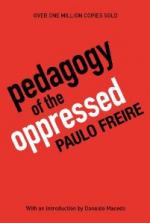
|
| Name: _________________________ | Period: ___________________ |
This quiz consists of 5 multiple choice and 5 short answer questions through Part 1.
Multiple Choice Questions
1. Why is dialogue so important to break these oppressive pedagogies?
(a) Because dialogue encourages critical thinking from one individual to another.
(b) Because dialogue lets them know what you feel about them.
(c) Because dialogue allows you to shout louder than them.
(d) Because dialogue allows you to plan how to fight back.
2. What does the author mean by the fear of freedom?
(a) Fear of authority figures.
(b) The mistaken idea of what being free looks like.
(c) The fear of being thrown in jail.
(d) Being allowed to say what you like.
3. Who was Eric Fromm?
(a) A social philosopher and social critic.
(b) An actor.
(c) An artist.
(d) A sculptor.
4. What does critical thinking help to analyzes, according to Friere?
(a) Philosophers.
(b) The Oppressed.
(c) The material reality, living conditions, and 'real' situation around the oppressed' lives.
(d) The Oppressors.
5. What does Friere maintain in the Preface that his readers must be ready for?
(a) The time of their lives.
(b) Revolution.
(c) Anything.
(d) Change.
Short Answer Questions
1. What point of view is this book written from?
2. According to Friere, what must the Oppressed first learn to do if they want to be free?
3. What occurs when the culture of oppression becomes internalized?
4. What is propaganda?
5. What is meant by the term ‘poverty of opportunity’?
|
This section contains 293 words (approx. 1 page at 300 words per page) |

|




